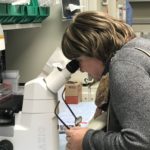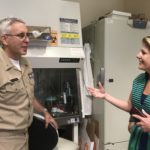 At any given time, there are numerous clinical trials in progress, helping us find new and better treatments to fight kidney cancer.
At any given time, there are numerous clinical trials in progress, helping us find new and better treatments to fight kidney cancer.
A clinical trial is a key component of bringing a new drug to market. It can take from up to a decade or longer for a clinical trial to be completed and for the FDA to approve a new treatment. Participation in a clinical trial should be carefully considered in collaboration with your doctor. It offers the opportunity for cutting edge treatments and makes an invaluable contribution to our increasing knowledge of how to best fight RCC.
Periodically KCCure will highlight an RCC clinical trial to offer a glimpse into the exciting work being done.
Recently, Dena Battle, President of KCCure, and I traveled to the National Institutes of Health (NIH) in Bethesda, Maryland to meet with Richard Childs, M.D., Clinical Director of the National Heart, Lung, and Blood Institute’s Division of Intramural Research and Julie Erb-Alvarez, a member of Dr. Childs’ team. We wanted to learn more about their research as well as a new clinical trial that is open for patients.
 Our visit included tours of the labs, and we also had an opportunity to look at RCC clear cells under the microscope. It’s amazing how something so small can cause so much destruction. I was taken by the enthusiasm and dedication to the work by everyone I met.
Our visit included tours of the labs, and we also had an opportunity to look at RCC clear cells under the microscope. It’s amazing how something so small can cause so much destruction. I was taken by the enthusiasm and dedication to the work by everyone I met.
Many people aren’t aware of the work that goes on at the NIH, but it’s a remarkable place for research. Unlike traditional hospitals, the NIH Clinical Center is one of the few places that has the ability to support decades of work focused on cutting-edge, first in human, paradigm-shifting research.
 Dr. Childs’ work in RCC goes back decades. He was the first to establish that transplanted donor T-cells could cure patients with metastatic renal cell carcinoma. In his lab, he also discovered a human endogenous retrovirus that was expressed in the majority of renal cell carcinomas. Using that retrovirus as a target, Dr. Childs and his team were able to identify the exact molecular mechanism that led to its expression in kidney cancer.
Dr. Childs’ work in RCC goes back decades. He was the first to establish that transplanted donor T-cells could cure patients with metastatic renal cell carcinoma. In his lab, he also discovered a human endogenous retrovirus that was expressed in the majority of renal cell carcinomas. Using that retrovirus as a target, Dr. Childs and his team were able to identify the exact molecular mechanism that led to its expression in kidney cancer.
Next, Dr. Childs worked to clone T-cell receptors that would recognize a specific retroviral protein and attack it. The trial that is open today involves taking human T-cells from patients with clear-cell RCC, modifying them so they can recognize the target protein and then reinfusing them back into the patient. The hope is that these new T-cells will attack the cells harboring the active retrovirus and destroy the cancer.
While it may sound simple in this description, this whole process – from the discovery of the principle to bringing it to human trials – has taken 20 years.
HERV-E TCR Transduced Autologous T Cells in People with Metastatic Clear Cell Renal Cell Carcinoma.
The trial that is now open is currently in a recruiting status and actively seeking new participants. Two people were enrolled at the time we visited the NIH. The goal is to enroll 24 participants. As with any trial there are specific criteria to be met for you to be considered. This includes, among other things:
- Being at least 18,
- having clear cell RCC,
- measurable disease progression in the last six months;
- and being positive for HLA-A 11:01.
HLA-A 11:01 is only present in a subset of clear cell RCC patients. The NIH, at no charge, can arrange testing for you if you are interested in finding out if you are positive for HLA-A 11:01. Additionally, there are some eligibility requirements related to prior treatments.
The trial involves a 2 to 3 week stay at the NIH and a caregiver is asked to stay with you for these weeks. If this sounds like a fit for you in your treatment plan, contact your oncologist. They can work with you to evaluate the trial and reach out to the NIH.
Anyone who fits the eligibility and is selected for an NIH trial can participate, regardless of where you live or your insurance status. All costs for treatment are covered by the NIH and in many cases, travel costs are also covered.
You can learn more about this trial and get information to share with your doctor here.
If you are interested in seeing information on all trials available for kidney cancer, you can search for them at www.clinicaltrials.gov.
Want to just see trials that are open in kidney cancer at the NIH? Try refining your search to locations in Bethesda, Maryland!
On behalf of KCCure and kidney cancer patients around the world, I want to express my thanks to Dr. Childs and Julie Erb-Alvarez for the time they took to meet with us, share this information, and make us welcome. Knowing the NIH is hard at work looking for cures leaves me very optimistic for the future.
 Laura Loughlin is Director of Patient Engagement for KCCure. She is a stage 4 kidney cancer survivor from Boston, MA
Laura Loughlin is Director of Patient Engagement for KCCure. She is a stage 4 kidney cancer survivor from Boston, MA








